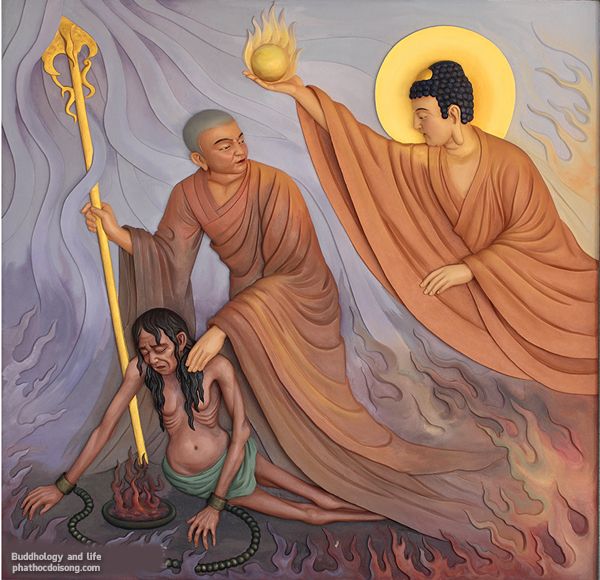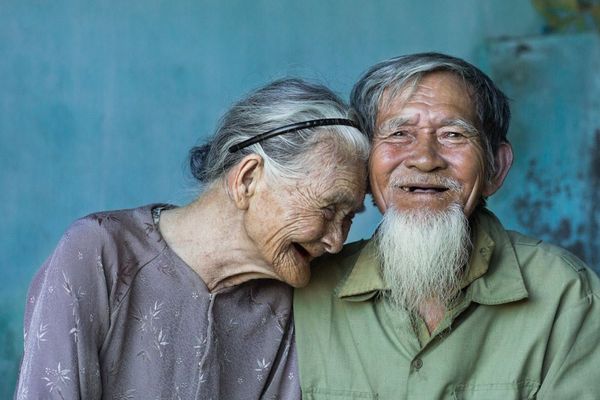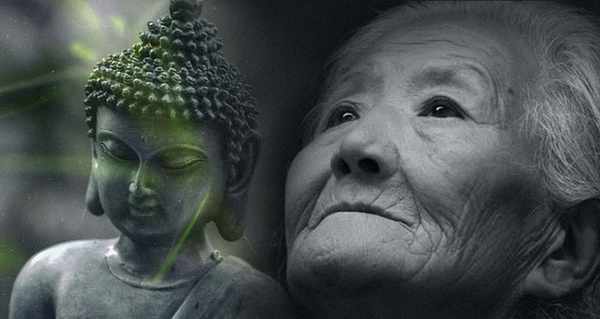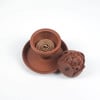Meaning of Vu Lan's day in the life of Vietnamese People
In Vietnamese, Vu Lan Festival is one of the main holidays of Buddhism (Northern Mahayana) and Chinese customs, on this day, the son will devote all his heart to repay the kindness of his parents. ancestor. Moreover, the children will also release lives and do meritorious deeds so that their parents can enjoy merit. In English, Vu Lan festival is written as Vu Lan festival.
On this day, the Buddhas are very happy to see that their disciples have good hearts and know how to repent of their mistakes. That's why it's also called Buddha's day of joy. That is the first meaning.

The second meaning, this day is the day to recall the filial piety of the Buddha's children. Because in the spirit of Vu Lan, the full moon day of the seventh month is the day when Venerable Muc Kien Lien found his mother being born in a suffering hungry ghost life, which he himself could not save. He asked the Buddha to teach the method of saving his mother.
On that occasion, the Buddha taught that if you want to save your mother from harm, you should make offerings to the monks and nuns. Thanks to the blessings of the Sangha, the nuns helped his mother transform her evil mind and get rid of the hungry ghost life. With the respect of a filial son, he did exactly what the Buddha said and his mother also got rid of the hungry ghost life.
It is thanks to that sincerity that until the full moon of the seventh month is the fourth day of the Sangha, the Buddha taught us to make offerings to the monks, thanks to the help of the monks, the mother in many lives was super-elevated. Therefore, this day is also known as the day of filial piety.
During this season, each of us Buddhists remembers the merits of our parents who were born and raised in hardship, so we rely on the attention of the monks and nuns. If parents have fallen into the path of suffering, by virtue of this merit they will be freed. If the parents do not walk in the path of suffering, then through this merit they will increase their wholesome roots. If parents present money, it will also increase their lifespan and generate bodhicitta. That is the meaning of filial piety of the Buddha.
Vu Lan day is also known as the day of pardon of the dead. It is a day of forgiveness for all mistakes, a day when everyone repents, asks for forgiveness, asks for forgiveness. Thanks to the meaning of forgiving those mistakes, it is on this day that monks and nuns sincerely pray for the dead to be free from suffering. I have briefly talked about the meaning of Vu Lan holiday.

When Buddhists think of the great merits of their parents, we must wholeheartedly repay them (Illustration image. Source: Internet)
Many times, Buddhists wonder, Buddha taught that children must be filial to their parents, but teachers and ladies left their fathers and mothers to practice, that is unfilial, how can we teach Buddhists to be filial? Not so. At first glance, we see it as unfilial, but on the contrary, it is filial piety. Why?
Because going to the monastery does not mean finding a comfortable place to enjoy peace for oneself, but because of loving parents, loving living beings; I want to practice how to solve my own problems and suffering, and then help my parents and guide everyone in the direction of the moral path, away from the sinful things. It's a tribute to parents.
According to the world, filial piety to parents is to take care of everything, including food, clothing, bedding, medicine... but is there anyone who cares that their parents won't die? No matter how well you raise it, you must die. According to the spirit of Buddhism, we are not only present in this life, but also present in countless previous and future lives, so if we lose one body, we will take on another body. Therefore, if this body does not know how to do good, I am afraid that in the next life, I will fall into a miserable path. Therefore, the cultivator must do how to awaken their parents to a good path, so that if their parents die, they will be happy and peaceful in the next lives.
For example, my parents at the age of sixty, have a child at the age of ten, and set out to become a monk. The parents were upset at first, but then embarrassed themselves. Because I think my child is young, but he is not greedy for food, he is not greedy for fame and gain; I'm old and still haven't woken up. Thinking like that, I naturally imitated, gradually reducing my appetite, practicing vegetarianism again, and being less greedy for fame and profit, so I practiced slowly. Obviously, at first, I thought I was bad, but later on, I found it better. Therefore, in most families with children going to the monastery, gradually parents and family members also imitated the practice. That is the spirit of filial piety of the monastic.

In most families with children going to the monastery, gradually parents and family members follow suit. That is the spirit of filial piety of the monastic (Artwork. Source: Internet)
People in the world think that raising their parents is full and full of filial piety, but they forget that their parents' lifespan is limited, and they have to go to any extent. So how do you take care of the present and be happy and think about the future? After parents leave this body, the next body must also be bright and much better. That's what is called a genuine, long-term caretaker. Thus, the spirit of a cultivator is not to abandon his parents, but to love his parents. Because I want to direct my parents to the good path and direct my relatives to generate the Bodhi mind, I went to practice.
In our Vietnamese tradition, filial piety is a very sacred and noble thing. Everyone knows that being filial to their parents can be a good person in society. Therefore, filial piety is a very necessary moral foundation.
In the past, our ancestors also taught these things. I quote a few passages from folk songs and proverbs to show you that filial piety is a very important thing:
"Raising children does not take care of themselves
The wet side of the mother lies, the dry side of the roller
Knowing how to pay for the meaning is difficult
Go up the hill to roll up the stone to build a mausoleum to worship."
Through these four sentences, you can see that the common people in Vietnam are very grateful to their parents.
"Raising children does not care for themselves", when parents raise children, they do not think about themselves at all, as long as the child is healthy, the parents are happy. If the child is sick or has trouble or has a disability, the parents are sad. Parents want to sacrifice themselves for their children to be healthy. No matter how hard it is, how difficult it is, it is not boring or boring.
The following sentence "The wet side of the mother lies, the dry side of the roller", how penetrating!
Forty-five years ago, in Vietnam, the economy was very difficult. If you live in the countryside, you will see poor parents in a house with torn leaves and only one bed. A child about one or two years old is sick or bedwetting at night. When wetting the bed, it is wet and wet without a mat, so the mother lies on the wet side, leaving the child in a dry place for him to sleep well.
The love of a country mother like that, who doesn't think about herself, but only thinks about how to make her child sleep well, be healthy, and grow up quickly. The old mother lived in that miserable situation, so she could say this sentence "the wet side lies, the dry side rolls". A mother always spreads herself to her children, forgetting all suffering and pain, as long as she can make her children eat well and sleep well, that is peace of mind.
Parents do not consider themselves, do not think about their own part, what should children do?
We are children, if we want to repay that grace, we must remember the saying "know how to pay for the hardships, go up the hill to roll up the rocks to build a shrine to worship".
When my parents died, I grew up, I was grateful to my parents, I didn't know how, so I pry stones and build a mausoleum to worship my parents, that's according to worldly people. According to the Buddhist spirit, if our parents are dead, we try to do good and good deeds to dedicate to our parents. If our parents still have money, we worry that they will be well-fed, happy, and know how to focus on the Three Jewels, which is the duty of a filial son.
One more post:
"Princess is a great mother and father
Hard work does not take care of life for me
So people, we have to feel sorry
Paying back is as heavy as the sky."
It means that the gratitude to parents is very high, there is no comparison. My parents never thought that I raised him for about three years, seven years and then let him go whatever he wanted. From a young age, lying in a crib until growing up, having a couple of friends, having children, still worrying. From children to grandchildren, until the head is white, and then the day of death will come. So to see the deep affection of parents for their children is not known how much to tell. So what is our duty as a child?
"For people, we must feel sorry", when growing up, then thinking about the merits of parents like the sky and the ocean. That grace is deep and heavy, not ordinary. Therefore, when Buddhists think of the wonderful and sublime merits of our parents, we must whole-heartedly repay them. If we can't return more than five, ten, but we can't leave our parents like that, then it is not knowing the righteous way.
In Buddhism, it is often reminded that in the five crimes of rebellion, the sin of being unfilial to parents is the first.

































